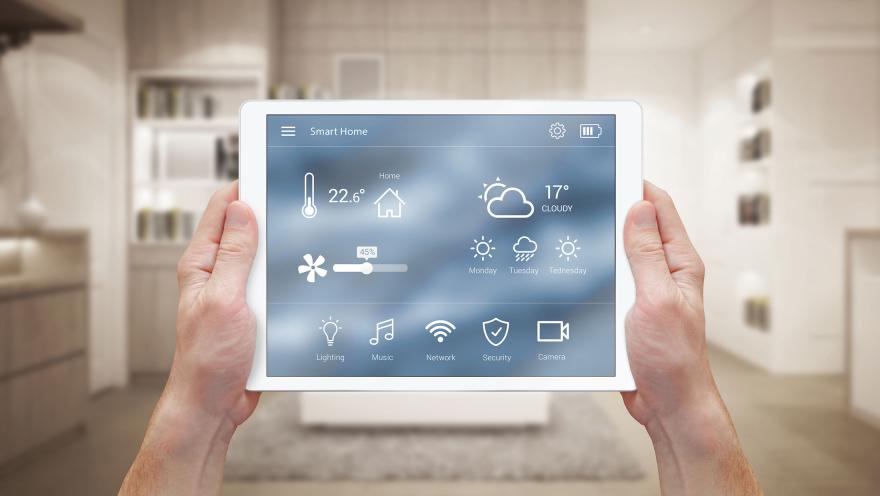Patti Lydiard works in hospitality. She is also the primary caregiver to her husband Alan, who is living with ALS. When she shared her story on a recent episode of Connecting ALS, Patti talked about the increased risk of exposure to the coronavirus she would face as New England begins to draw summer vacationers. She also talked about the added stress of simply leaving the house at a time when the use of outside caregivers is made difficult by the coronavirus.
That stress is mitigated somewhat by their use of smart home devices, which provide them with both an added sense of security and connectivity they otherwise would not have. “I have an Alexa that with the drop in I'm able to, while at work, be able to call in to him and he doesn't have to worry about picking up a phone, that I can, you know, speak with him while I'm at work or different things that way to make sure that he's okay.”
They also use a Nixplay, a Wi-Fi enabled picture frame they received from their daughter as a Christmas gift. “She’s able to download pictures she comes across when she was little or the grandkids,” she said. “Every day we put that on and it's all positive pictures that are coming through of happy moments.”
The COVID-19 pandemic has forced many aspects of life into digital spaces and may be accelerating acceptance of technology into our lives – things like distance education and telehealth. We spoke to Valerie Bombardier, care services assistant at the ALS Association Minnesota/North Dakota/South Dakota Chapter about ways that smart home technology is helping to enhance the quality of life for people with ALS.
For people living with ALS, reduced physical mobility and the ability to communicate often cause “Smart” homes – in which household items become connected and are controllable with the use of technology – can greatly improve accessibility and be life-changing for people living with the disease.
When performing regular tasks become difficult or even impossible, the loss of independence can be deeply frustrating for many people. Smart device technology outfitted within a home works in an assistive capacity to help restore and maintain a person’s autonomy and reduce their dependency on friends, family members, and caregivers.
These environmental controls are either voice- or touch-activated using tablets and smart phones with various apps. So, you can draw your curtains, turn the lights and television on, raise the temperature in the room, and lock the door in seconds, expending only the effort it takes to tap your phone a few times. The introduction of a digital assistant or smart speaker, such as a Google Home or Amazon Alexa, takes that even further by performing many of these actions with simple voice commands.
“One of the main components we see with this type of technology is it can provide people with ALS the ability to hang on to pieces of their independence and sense of control of their environment and how they communicate with people for a much longer period of time,” Bombardier said. Valerie works closely with people living with ALS and their families and helps to facilitate a communication and assistive device program for the chapter.
From increasing everyday connectivity to helping maintain a safe and comfortable environment, this technology can provide great benefits for people living with ALS. Here are just some of the items that are now available in “smart” form:
- Thermostats
- Lights
- Smoke alarms
- Door locks
- Doorbells
- Robotic vacuum cleaners
- Garage doors
- Curtains and blinds
- Carbon monoxide detectors
- Motion detectors
- Security cameras
- Kitchen appliances
“This is an exciting time for technology, things are becoming much more intuitive. We find a lot of these products are able to help the people we serve from the very beginning of diagnosis and continue to help through the progression of their disease,” said Valerie.
The homes we live in will likely continue to get even “smarter” in the coming years, especially as the technology continues to evolve and the prices continue to come down. The use of these devices can help enhance the ability for people to live with ALS, using technology and equipment to improve their quality of life and enjoy greater independence.


Comments
I have a gentleman who is rapidly progressing in disability from ALS. He no longer has use of his hands or arms and legs are rapidly deteriorating to point he can no longer stand. His mind is sharp and he speaks well.
I am looking for technology available which may permit him to use voice commands to use his smart phone and to adjust his TV. He is a sports fan.
We have secured a smart TV, set him up with a Google email account, an Amazon account and provided him with an Alexa connected to the internet. My problem is making them work together as my technological abilities are limited.
Any suggestions would be welcomed.
Thank you in advance.
Hi Jeff, your local chapter may be able to help you with this issue. Find their contact information at als.org/chapters.
I would like to learn about smart home technology and ALS.
Hi Debby. You might be interested in this video, Utilizing Smart Home Technology to Maintain Your Independence: https://www.youtube.com/watch?v=6a4iAeQEeb8
Join the conversation. Please comment below.